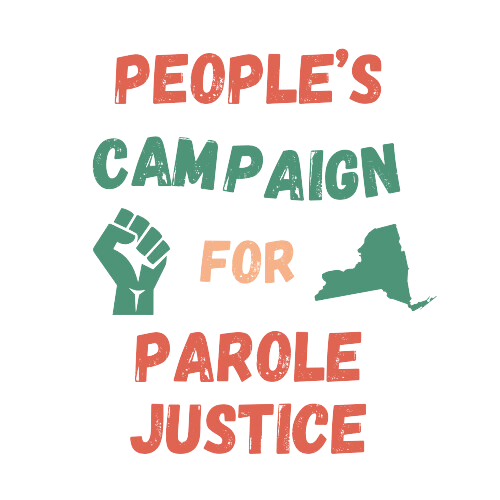#ParoleJusticeNY Fact Sheet for Media
Overview of Parole Eligibility in New York State
There are two types of prison sentences in New York: 1.) determinate, which is a fixed number of years and 2.) indeterminate, which is a range of years (e.g. 1-3 years or 25 years to life). Parole is the system by which people serving indeterminate sentences obtain release. Once those serving indeterminate sentences have reached their minimum sentence (e.g. 25 years on a 25 to life sentence), they become eligible for parole. This is not “early release”, but instead an opportunity for people to serve the remainder of their sentence at home under parole supervision. The original purpose of parole release was to ensure that people who are rehabilitated can leave prison and return to the community. *The parole release process is not to be confused with parole supervision*
Key Facts About the #ParoleJusticeNY Movement
1. Who We Are and What We Want
The People’s Campaign for Parole Justice (PCPJ) is a grassroots coalition of more than 300 organizations across New York State. PCPJ advocates for the passage of the Elder Parole Bill (S15/A3475) and the Fair + Timely Parole Act (S1415/A4231) and for the Parole Board to be fully and fairly staffed. All of our demands are focused on the parole release process and the operation and composition of the Parole Board, and will impact people currently incarcerated.
Other organizations and advocates are leading the movement to reform parole supervision, which begins after someone is released, and to restore the voting rights of people on parole. Separately, probation is a form of community supervision for people who are not sentenced to prison.
2. What Our Bills Do and Don’t Do
Elder Parole: Elder Parole would allow incarcerated people aged 55 and older who have already served 15 or more consecutive years a chance to go before the Parole Board for a hearing.
Fair + Timely Parole: The bill would change the standard of parole by centering release on the person’s rehabilitation while incarcerated. Parole commissioners would no longer be able to deny release based solely on the crime for which the person is convicted.
These bills are NOT blanket release policies and do not give automatic release to anyone. They simply provide people in prison opportunities to be heard and considered for release by a Parole Board and make parole considerations more fair for everyone appearing before them.
3. Many Survivors of Crime Support #ParoleJusticeNY
The narrative that reforms to the criminal justice system are in conflict with victims’ rights and needs does not fully represent the varying experiences and desires of victims. Many survivors of crime want less punishment and incarceration because they have experienced the failure of the system to provide healing and accountability for all involved. When the parole process includes recognition of the transformational growth of incarcerated people, it also creates space for healing and accountability. Furthermore, survivors and people impacted by mass incarceration are not always two distinct groups. There are many survivors who have loved ones in prison, who have been criminalized for acts they have committed in the process of surviving violence, and who are incarcerated now, trying to heal from violence and abuse within the inhumane environment of our prisons. All this is why leading survivor advocacy groups like the New York State Coalition Against Sexual Assault, the Crime Victims Treatment Center, Rising Ground, and Girls for Gender Equity are supporting the campaign.
Resources:
Parole Justice Facts
Parole Justice FAQs
Crime Survivors Speak Report
Parole Justice is Survivor Justice

